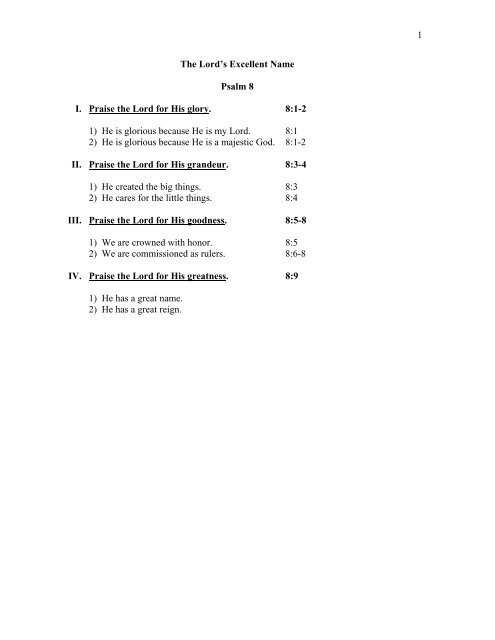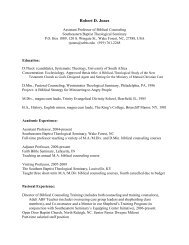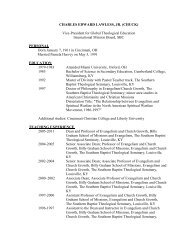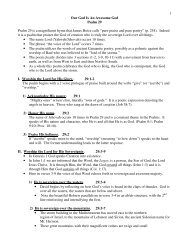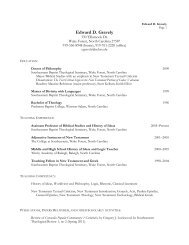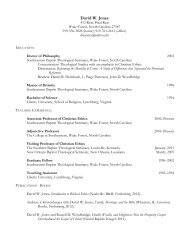Psalm 8 The Lord's Excellent Name Outline And ... - Daniel Akin
Psalm 8 The Lord's Excellent Name Outline And ... - Daniel Akin
Psalm 8 The Lord's Excellent Name Outline And ... - Daniel Akin
You also want an ePaper? Increase the reach of your titles
YUMPU automatically turns print PDFs into web optimized ePapers that Google loves.
1<strong>The</strong> Lord’s <strong>Excellent</strong> <strong>Name</strong><strong>Psalm</strong> 8I. Praise the Lord for His glory. 8:1-21) He is glorious because He is my Lord. 8:12) He is glorious because He is a majestic God. 8:1-2II. Praise the Lord for His grandeur. 8:3-41) He created the big things. 8:32) He cares for the little things. 8:4III. Praise the Lord for His goodness. 8:5-81) We are crowned with honor. 8:52) We are commissioned as rulers. 8:6-8IV. Praise the Lord for His greatness. 8:91) He has a great name.2) He has a great reign.
2<strong>The</strong> Lord’s <strong>Excellent</strong> <strong>Name</strong><strong>Psalm</strong> 8Introduction: 1) Everyone has a worldview, a particular way of looking at life. It helps youdeal with the ultimate questions of life like who am I? Why am I here? Is there a God?What’s it all about? What will happen to me when I die? Is anything worth dying for? <strong>The</strong>sequestions are unavoidable. We have been asking them since time began and sin entered theworld.2) On the inside, deep within our souls, we have a nagging and lingering sense that things arenot quite right, something has gone wrong, something is amiss in our world and lives. <strong>The</strong>great church father Augustine (354-430) saw our dilemma and in a sense blamed it on God.He wrote, “You have made us for Yourself, and our souls are restless until they find their restin You”. History would seem to support Augustine’s thesis, for wherever you look andwhenever you look you quickly discover that humanity is incurably a religious, worshipingcreature. He must find a god to worship, even if it is the wrong god who is destined todisappoint and not deliver, the wrong god who actually is nothing but an idol.3) It may be the god of the:atheist – who saying there is no god, turns and worships himself.pantheist – who worships creation and all that is.deist – who tips his hat toward God convinced He is out there but doesn’t care.finite theist – whose impotent god is hardly worthy of worship.panentheist – who thinks he senses a divine force running throughout the universe like anelectrical charge we need to tap into.polytheist – there is a smorgasbord of gods for the picking and choosing. <strong>And</strong>, the more thebetter.4) In contrast to all of this the Bible paints a completely different picture. Here we discoverthere is one and only one God who is personal, powerful and perfect. He is the awesome Godwho made the Universe and all that is in it. He is also the approachable God you can know byname and with whom you can have a life changing relationship. <strong>Psalm</strong> 8 tells us all about it.5) <strong>Psalm</strong> 8 is a hymn of praise, of creation praise. Its origin is perhaps in young David’s lifeas a shepherd, when lying in the fields one night gazing into the majestic night sky, he wasfilled with awe and wonder concerning God’s marvelous creation. This God, and only thisGod, is to be worshiped and adored as the good and great Creator, Ruler and Sustainer of allthings. <strong>The</strong> psalm looks back to Genesis 1-2 and God’s Creation, especially His creation ofman. However, it also looks forward in anticipation to the coming of a New Man, a secondAdam, who will make right all that has gone wrong since sin entered the world through the 1 stAdam’s disobedience. That man is the Messiah, the Lord Jesus, who regains for us Paradiselost. A God who accomplishes all of this truly has an excellent name!Transition: What does David believe we should do when we are confronted with such a great,majestic and awesome God?I. Praise the Lord for His glory. 8:1-2• <strong>Psalm</strong> 8 has 4 major components. <strong>The</strong> 1 st (v.1) and the 4 th (v.9) are identical, formingwhat we call in literary terms “inclusio” or bracketing. All of the psalm, every word
3and every truth, is to be understood in the light of the excellence, the majesty, of thename of the Lord. <strong>The</strong> psalm has the appropriate starting point for genuine andauthentic worship: it begins with God. Why is the Lord glorious to the children ofGod?1) He is glorious because He is my Lord. 8:1o <strong>The</strong> corporate community of believers has gathered for worship. As theycontemplate who their God is and what their God has done they breakout inpersonal praise: O Yahweh (Lord, Jehovah), our Adonai (Lord).o Yahweh is His personal, covenant name revealed to the Hebrews. It occurs5,321 times in the O.T. Gerald Wilson points out Yahweh carries within it boththe idea of “the God who is and the God who will be.” <strong>The</strong> name is “apowerful promise of continuing divine presence in their lives” (p. 210). <strong>The</strong>psalmist begins in worship as we should begin. He begins His theology as weshould begin our theology: with God. <strong>The</strong> starting point is crucial!o David begins with 2 great names of God and wonderfully notes that Jehovah isour Lord, our governor, ruler, master. This great God is my God!2) He is glorious because He is a majestic God. 8:1-2o Michael Wilcock notes verse one is so familiar “that we can easily miss itsshameless political incorrectness. <strong>The</strong> Bible world, like ours, was pluralistic,awash with all sorts of different beliefs: in the view of any correctly thinkingperson, all of them valid, but none of them actually ‘right’ in such a way as tomake the rest wrong. Not so the psalmist. <strong>The</strong> Lord, the God of Israel and theBible, is not just our Lord, he says, but the name, the only name, to be honoredin all the earth and even above the heavens. Little Israel is right, and the restare wrong.” (p. 39).o This God’s name is excellent (NIV, majestic) in all the earth. His glory setabove the heavens! All of creation cannot contain His greatness, His majesty.<strong>And</strong> yet His greatness is displayed in little things as well, such as in the simpleand even humiliating manner in which He dismisses His enemies.“From the mouths of babes and infants You have ordained, establishedstrength.” <strong>The</strong> greatness of creation proclaims your majesty, and so does thecry of the infant and the chatter of a small child. In fact it is the weak whosilence the wicked, the tiny who shut the mouths of God’s enemy, one in amanger who would put to flight the avenger (NASV, “revengeful”).o Paul said something similar to this in 1 Corinthians 1:26-29 when he writes,“For you see your calling, brethren, that not many wise according to the flesh,not many mighty, not many noble, are called. But God has chosen the foolishthings of the world to put to shame the wise, and God has chosen the weakthings of the world to put to shame the things which are mighty; and the basethings of the world and the things which are despised God has chosen, and thethings which are not, to bring to nothing the things that are, that no flesh shouldglory in His presence” (NKJV).o Jesus applies v. 2 to Himself in Matthew 21:15-16 as He made his great entryinto Jerusalem: “But when the chief priests and scribes saw the wonderfulthings that He did, and the children crying out in the temple and saying,
4“Hosanna to the Son of David!” they were indignant. <strong>And</strong> they said to Him,"Do You hear what these are saying?" <strong>And</strong> Jesus said to them, "Yes. Have younever read, 'Out of the mouth of babes and nursing infants You have perfectedpraise'?" (NKJV).One should not miss what the children were saying! We must not miss thepoint that in applying <strong>Psalm</strong> 8:2 to Himself, He also was claiming to be themajestic God of whom the babes and infants give witness!II. Praise the Lord for His grandeur. 8:3-4• David moves once again to consider the heavens (v.1), though he will again descend tothe earthbound realm (v.2) to reflect upon the paradox of mankind’s insignificance, butalso the lofty status bestowed upon him an act of pure grace by the great God. ThatGod, in the expanse and grandeur of His creation would pay attention to a speck of dustlike man is all the more reason to proclaim the excellence and majesty of His name.1) He created the big things. 8:3o David considers, meditates on the heavens that belong to God (Yourheavens…Your fingers). He says they are the “work of Your fingers.” This iswhat we call an anthropomorphism, ascribing human characteristics to God inorder to make a point. <strong>The</strong> point is this: creating billions of stars in billions ofgalaxies is child’s play to God. He snaps or points a figure and it is done, all ofit. He did not even need to warm up. He does not even break a sweat. Howsimple all of this is for Yahweh our Adonai.o David takes note of the moon and the stars which God has ordained (NIV,“which you have set in place”). <strong>The</strong> innumerable points of lights in theheavens, the clockwork precision with which the moon and stars turn and thenreturn again and again and again to map out the days, weeks, months, and yearsof human existence is truly indescribable, beyond our ability to comprehend.Humans come and go, but the moon and stars continue in their regularappearance. A man fails to show up for work, the number of his days is at anend, but moon and stars appear once again undisturbed, without fail, ready toserve their Maker. Each is right where it should be all the time, every time, inperfect obedience to its Master who ordained its existence and assignment. YesYahweh our Adonai created the big things.2) He cares for the little things. 8:4David now descends from the lofty heights of the heavens to the lowly regions ofplanet earth. Overwhelmed and left nearly speechless, he now considers himself, hethinks about us, in the context of this massive cosmic masterpiece called creation.All he can do is muster a single question set in appropriate Hebrew parallelism:“What is man (enosh) that You are mindful (NASV, “take thought”) of him, and theson of man (ben adam) that You visit (give attention to or care for) him?” Lookingup into the grandeur of the heavens David feels dwarfed and shamed intoinsignificance at the greatness of creation and the smallness of humanity. A speck?
5We are less that that! I think I am something special when I consider all of this?Who am I kidding?! On earth I am nothing. In this incredible universe, I am reallynothing.Enosh (man) speaks of our weakness and frail human existence. It highlights ourmortality. We come and go, live fragile, troubled lives, and leave quickly with littlenoticeable or lasting impact if the truth be told.Ben adam (son of man) likewise emphasizes our fragile mortality, but it also maypoint to our dependence on God and His attentiveness to us in our need of Him.Man is an earth creature and yet in grace, God has given him glory and honor (v.5-7). Infinite God cares for finite man. <strong>The</strong> God who created the big things also caresfor the little things, even you and even me. He is mindful of us, he is attentive to us.He has not forgotten you. He has not forgotten me. In the midst of running,sustaining and superintending His massive creation, He was watching over me allnight long and when I awoke this morning, He was right there at my side to say“good morning, I am here to spend this day, like every day, with you!” What a God.What a Lord. What a Father. What a Savior. What a Comforter is our God.III. Praise the Lord for His goodness. 8:5-8• God would say to us today, you are not out of sight or out of mind. I see you, I knowyou by name, and as my imagers, I have honored you. Looking back to the creationaccount in Gen. 1, David notes both the dignity and responsibility with which God hasendowed mere mortals. Pure grace, pure goodness is the only thing we can say.1) We are crowned with honor. 8:5o Set apart from the animal world, the Bible says look up to get the properperspective on who we are. Draw your dignity from God not beast.o We were made a little lower than Elohim. A troubling word with a significantsemantic domain or bundle of meanings, note the following translations:• A little lower than the angels (NKJV)• A little lower than the heavenly beings (NIV, ESV)• A little lower than God (NASV, NLT)• A little lower than you yourself (CEV)• A little less than a god (Rev. Eng. Bible)• Yet we so narrowly missed being gods (<strong>The</strong> Message)o Though the precise meaning is uncertain, the basic meaning is clear. We aredescribed as a little lower than those in the heavenly realm, not a little higherthan the animal realm. Evolution may say we are slightly above the beast butGod says we are just a little lower than Himself and His angels. Further as Hisvice-regents and delegated authority on earth, we are crowned with glory (likeGod, cf v. 1!) and honor. This should impact our sense of what it means to behuman. This should impact who and what we aspire to be. James Boice puts itin proper perspective,“it is nevertheless humanity’s special privilege and duty to look upwardto the angels (and beyond the angels to God, in whose image women
6and men have been made), rather than downward to the beasts. <strong>The</strong>result is that they become increasingly like God rather than increasinglybeast-like in their behavior….But here is the sad thing. Although made in God’s image and ordainedto become increasingly like the God to whom they look, men andwomen have turned their backs on God. <strong>And</strong> since they will not lookupward to God, which is their privilege and duty, they actually lookdownward to the beasts and so become increasingly like them.” (p.71).o John Piper sees the significance of all of this. Lose sight of who man really isand you lose sight of who God really is in all of His majesty. <strong>And</strong> lose sight ofGod and His majesty and the world goes bizerk!” All of it hangs together andthe fallout when we get it wrong is enormous. Thus Dr. Piper says,“Now I hope you will agree from this psalm that the truth follows: Youcannot worship and glorify the majesty of God while treating hissupreme creation with contempt-whatever color or whatever age thatcreation might be.You cannot starve the aged human and glorify the majesty of God.You cannot dismember the unborn human and glorify the majesty ofGod.You cannot gas the Jewish human and glorify the majesty of God.You cannot lynch the black human and glorify the majesty of God.You cannot treat human pregnancy like a disease and glorify themajesty of God.You cannot treat the mixing of human races like a pestilence and glorifythe majesty of God.You cannot worship and glorify the majesty of God while treating hissupreme creation with contempt.” (“What Is Man,” 1-16-94)o Yes we are a little lower than heavenly beings crowned with glory and honor.We must not lose this perspective. If we do, as Alistar Begg notes, we devolveinto nothing more than a monkey or a machine, neither of which has inheritvalue, dignity or worth.2) We are commissioned as rulers. 8:6-8<strong>The</strong> psalmist continues as if he is oblivious to the Fall. Highlighting the functionalaspect of the image of God in man, which is also the emphasis of Gen. 1, he noteswe have been fashioned by God for dominion and rulership. Thus:• We are made to have dominion (be rulers) over the works of your hands (cf v.3,another anthropomorphism)• He has put all things under our feet, a symbolic act in the Ancient Near East todemonstrate superiority over a defeated enemy or foe. A king would stand, puthis foot on the neck of his enemy lying on the ground at his feet. <strong>The</strong> king isexalted and the enemy humiliated. <strong>The</strong> king rules and the enemy submits.Thus:
7o All sheep and oxeno Beast of the fieldo Birds of the airo Fish of the sea, that pass through the paths of the seaAll of this God has put under our feet, out authority, our lordship.o <strong>And</strong> yet is this true now? If we look back to a pre-fallen world we see how thisis the way things were. But now…this is not the world that we live in. This isnot the way things work. This is clearly not the way things are. Right now wedo not live in a <strong>Psalm</strong> 8 world. Verses 6-8 direct us back to the idyllic scene ofthe Garden of Eden, but they also drive us to look to the future asking,wondering, can Paradise be regained? Can the Fall be reversed? Can death bedefeated, tears dried up, sorrow, pain and suffering be no more? Will thereever be a day when “all things” are once again under the feet, the authority, ofmen, of any man?o <strong>The</strong> book of Hebrews says yes! Quoting <strong>Psalm</strong> 8 in 2:6-8 the author honestlyacknowledges that “but now we do not yet see all things under him. Oh, butnow read v. 9: “But we see Jesus who was made a little lower (or”for a littlewhile”) than the angels crowned with glory and honor…”o Paul saw a specific implication and application of <strong>Psalm</strong> 8 in Eph. 1:22-23where the all things under the feet of Christ includes “the church, which is Hisbody, the fullness of Him who fills all in all.”o Paul also saw the eschatological and Christological impulse pulsating throughthe heart of this <strong>Psalm</strong>. In 1 Cor. 15:24-28 Paul sees the last enemy which isdeath destroyed and all things brought under subjection to the Son of God whowill give it all back to the Father from where it all came.o Yes, there is a future grand and glorious, bright and beautiful, marvelous andmajestic for the sons of Adam and the daughters of Eve. Paradise lost will beParadise regained because of a man, a man of God’s own choosing, even Jesusour Lord. His crown of thorns was actually a crown of glory, and now theglory of <strong>Psalm</strong> 8 is already His, with even death under His feet. <strong>And</strong> as coheirswith Jesus (Rom. 8), His present reign is our future destiny. Oh praise theLord for His goodness.IV. Praise the Lord for His greatness. 8:9• <strong>Psalm</strong> 8 ends as it begins, on a note of praise. Earlier we gave attention to the fact thatthe Lord is my Lord and a majestic God. Now we conclude by focusing on 2additional truths contained in these magnificent affirmations of God.1) He has a great name.o Yahweh, the self-existent one, the one who’s own existence is contained withHimself as Triune deity and sovereign, His is an excellent name. Wilson againis our helper in grasping the greatness of this name: Yahweh “is a majesticname for a majestic God, who promises to be with us, continues to revealhimself to us in each and every new circumstance, and yet remains foreverbeyond our power to control or manipulate to our own purpose” (p. 211). <strong>The</strong>word “excellent” can be rendered majestic (NASV, ESV, NIV). <strong>The</strong> wordcarries the related idea of mighty. Indeed the Bible affirms His name is:
8Majestic in His victories (Ex. 15:6, “<strong>The</strong> Song of Moses)Majestic in His judgment (Ps. 76:4)Majestic in His law (Isaiah 42:21)Majestic in His creation (Ps. 8:1, 9; 93:4).Yes, this God has an impressive, even intimidating name when you see theawesomeness of the one who bear that name.2) He has a great reign.o It is all the earth. It all belongs to Him. All of it is under His Lordship. Inevery square inch, He is there, and there to be praised.o Charles Spurgeon, the wonderful British Baptist and pastor in London capturedsomething of what the <strong>Psalm</strong> is saying when he wrote,“Descend to the lowest depths of the ocean where thewater sleeps undisturbed and the sand is motionlessin unbroken quiet. <strong>The</strong> glory of the Lord is there, revealingits excellence in the silent palace of the sea. Borrow thewings of the morning and fly to the farthest parts of thesea. God is there. Fly to the highest heaven, and God ispraised in everlasting song. Dive to the deepest hell,and God is justified in terrible vengeance. Everywhere,and in every place, God dwells…” (Spurgeon, Treasury of David, pg.45)Conclusion• <strong>The</strong> great theologian J.I. Packer says, “we are at the end of 4 centuries of Godshrinking.” He gets smaller while we get bigger. <strong>The</strong> Bible does not see it this way.David did not see it this way. We must not see it this way. “O Lord, our Lord, Howexcellent is Your name in all the earth.” If you will just listen, you can hear thosewords in the mouth of a child, or a baby.• How Great Our God’s Majestic <strong>Name</strong>Words: Timothy Dudley-Smith, 1926-How great our God’s majestic <strong>Name</strong>!His glory fills the earth and sky.His praise the heavenly host proclaim,Eternal God and Lord most high.His fingers set the moon in place,<strong>The</strong> stars their Maker’s hand declare;In earth and sky alike we trace<strong>The</strong> pattern of His constant care.<strong>And</strong> what of us? Creation’s crown,Upheld in God’s eternal mind;On whom He looks in mercy down
9For tender love of humankind.His praise the heavenly host proclaim<strong>And</strong> we His children tell His worth;<strong>And</strong> great is God’s majestic <strong>Name</strong>,His glory seen in all the earth.<strong>The</strong> Son of Man saw Adam’s race,Sent lower than angels He made.Tasted death for all by God’s grace,Crowned with honor, what price He paid.


